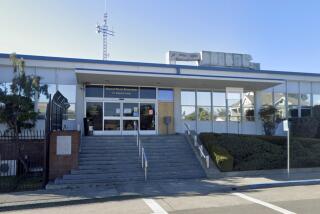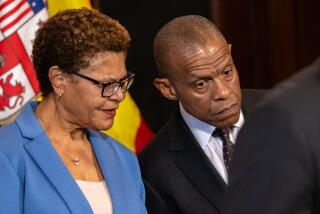Police Raked for Handling of Prostitute Murder Cases
Several community activists Tuesday complained to the Police Commission that the Los Angeles Police Department is mishandling and covering up an investigation of what appear to be serial killings of prostitutes in the South-Central area.
Condemning police silence on the slayings of at least nine women in the last three years, spokesmen for the NAACP and a group that was formed after an earlier wave of killings demanded that authorities release information about the killings and call in federal authorities to investigate whether the slayings are in any way linked to the murders of women in other cities.
The department’s refusal to publicize the slayings has further endangered the lives of poor black women living on the Southside, Margaret Prescod of the Black Coalition Fighting Back Serial Murders told police commissioners at the start of their Tuesday meeting.
“We are outraged that you have made so deadly a calculation when so many lives were at risk, a deadly kind of calculation that would not have been made were it any other community at risk. Imagine 12 or 13 or 29 women killed in Westwood. . . . Would it have been such a well-guarded secret?” demanded Prescod, who was accompanied by a member of the Altadena chapter of the National Assn. for the Advancement of Colored People.
Prescod also read portions of a statement from the U.S. Prostitutes Collective, in which the group complained that police harassment of prostitutes sends a signal that “it’s OK to hunt down hookers or alleged hookers.”
The criticism failed to pry any information out of police, and Police Chief Daryl F. Gates insisted that homicide investigators did not look at a victim’s color, occupation or life style in deciding how to handle a case. “We look to nothing except that the person is dead,” Gates said.
“We have to be very careful with what we say,” so as not to jeopardize the investigation, Gates added. “Whether there will be a statement forthcoming, I can’t say.”
Police Commission President Robert Talcott said his panel will look into the complaints but he would not comment on them.
Although news of the killings was leaked last week, police have refused to say anything except that they are investigating the slayings of women who sell sex for drugs. The timing of the killings appears to overlap by one year with those in the Southside Slayer case, in which 17 women were found strangled in the South-Central area between 1983 and 1986. One man has been convicted in one of those deaths, and two other suspects were charged separately in seven of the slayings.
More to Read
Sign up for Essential California
The most important California stories and recommendations in your inbox every morning.
You may occasionally receive promotional content from the Los Angeles Times.











